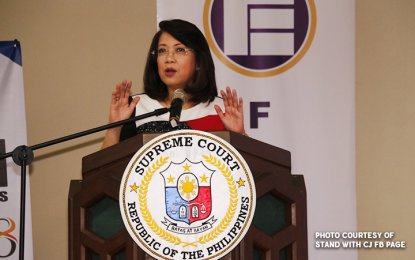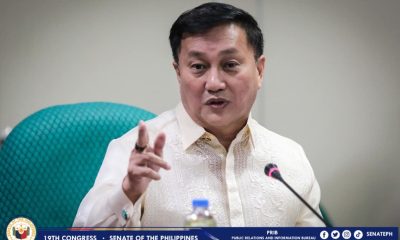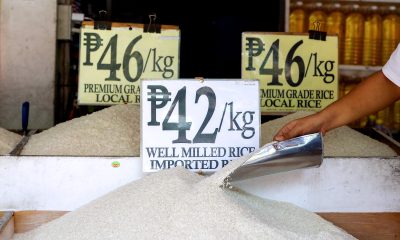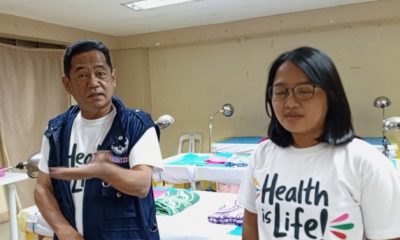News
Sereno failed to prove integrity for non-filing of SALN: Calida

FILE: Solicitor General Jose Calida said Chief Justice Maria Lourdes Sereno has failed the specific qualification of proven integrity for failure to comply with all the requirements of the Judicial and Bar Council (JBC) during her appointment as chief justice, including the submission of her Statements of Assets, Liabilities and Net Worth (SALNs). (PNA photo)
MANILA — Solicitor General Jose Calida said Chief Justice Maria Lourdes Sereno has failed the specific qualification of proven integrity for failure to comply with all the requirements of the Judicial and Bar Council (JBC) during her appointment as chief justice, including the submission of her Statements of Assets, Liabilities and Net Worth (SALNs).
“Respondent failed to prove her integrity before the JBC as required by Section 7(3), Article VIII of the 1987 Constitution. 126. Section 7(3), Article VIII of the 1987 Constitution prescribes, among others, that a person seeking a judicial post must be a person of proven integrity. The unambiguous language of the Constitution shows that Respondent must be a person of proven integrity as an indispensable condition for her appointment as Chief Justice,” Calida said in an 81-page memorandum submitted to the Supreme Court in connection with the quo warranto petition seeking to nullify Sereno’s appointment to the judiciary’s top post.
“If an applicant, like Respondent, were unable to file her SALNs in compliance with constitutional and statutory requirements, such failure to comply would mean that the applicant is not of proven integrity,” Calida noted.
He said Sereno should be measured by the same “yardstick” used for other public officials.
Quoting Sereno herself in the PS Bank vs. Senate Impeachment Court, Calida said “those who accept a public office do so cum onere, or with a burden, and are considered as accepting its burdens and obligations, together with its benefits”.
“They thereby subject themselves to all constitutional and legislative provisions relating thereto, and undertake to perform all the duties of their office. The public has the right to demand the performance of those duties,” he added, quoting Sereno in the memorandum he submitted to the high court.
Calida said among the obligations imposed on public officers by the Constitution under Republic Act (RA) No. 3019 (Anti-Graft Law) and RA 6713 (Code of Conduct and Ethical Standard for Public Officials and Employees) is the annual filing of SALNs.
Sereno has been accused of failing to submit her SALNs while she was still a law professor at the University of the Philippines (UP).
“She cannot be excused from complying with the law by claiming that one cannot acquire ill-gotten wealth in UP. If lowly court employees could be penalized for failing to file SALNs, there is no reason why she should be considered eligible for appointment to the highest post in the judiciary,” Calida said. “She can be measured by the same yardstick.”
The OSG alleged, among others, that Sereno failed to file her SALN 11 times in her 20 years as a law professor.
No independent evidence
“In her 20 years as a UP law professor, Sereno failed to file her SALN 11 times,” Calida said.
For her part, Sereno said Friday the Supreme Court should dismiss the quo warranto case against her for Calida’s failure to prove that she did not submit her SALNs when she was still a UP law professor.
Contrary to Calida’s assertion, Sereno said she had actually presented “substantial evidence” proving that she religiously filed all her UP SALNs as required under the applicable SALN laws.
“The Chief Justice has recovered 11 of her UP SALNs, and she has direct proof that she executed at least 12 UP SALNs (i.e., for the years 1985, 1989, 1990, 1991, 1993, 1994, 1995, 1996, 1997, 1998, 1999, and 2002),” Sereno said in a 137-page memorandum she submitted through her lawyers led by Alexander Poblador.
Sereno said her repeated filing of her SALNs proved that her “intent, plan and habit as a UP professor was to religiously file her SALNs.”
The Chief Justice noted that on at least three occasions — March 30, 2000, Nov. 1, 2003, and June 1, 2006 — the UP Human Resources Development Office (HRDO) cleared her of all administrative responsibilities and accountabilities, including the filing of SALNs.
She also never received any compliance order or show cause order from the UP HRDO or from any official of the university directing her to file her SALN for a particular year, or to correct or revise any of the SALNs she had filed.
During her stint at the UP College of Law, Sereno said there were periods when she was not required to file a SALN because either her
appointment was temporary or she was on leave and did not receive compensation.
“The status and appointment of the Chief Justice was merely temporary from 2 Nov. 1986 to 31 Dec. 1991. Accordingly, from 1986 to 1991, the Chief Justice was not required to file a SALN,” the memorandum read.
“The Chief Justice was also not required to file SALNs during the years when she was on leave and did not receive compensation as a UP Professor (i.e., the years 2001, 2004, 2005, and 2006),” it added.
Considering that she already has proof that she executed or filed 12 SALNs, she was actually missing only four SALNs for the years she was required to file them and these were 1992, 2000, 2003 and 2006, the memorandum stated.
Calida’s quo warranto petition was based on his claim that Sereno did not file UP SALNs and that she failed to meet the constitutional requirement of proven integrity when she failed to submit her UP SALNs to the JBC in 2012.
However, Sereno said the failure to file one’s SALN, or to submit the same to the JBC, had no bearing or relationship to her integrity.
Not required
SALNs, she said, are not among the documents that the JBC considers “evidence of integrity” under Section 1, Rule 4 of the JBC Rules. From the time of its creation in 1987 and for more than 20 years thereafter, the JBC did not require applicants for positions in the judiciary to submit their SALNs.
“The submission of SALNs was simply among the additional documents which the JBC had required of applicants for the position of Chief Justice,” she pointed out.
Sereno also stressed that no member of the JBC objected to her inclusion in the shortlist submitted to Malacañang, despite having had 11 chances to object to her candidacy on the ground of her failure to submit her UP SALNs.
She said the JBC, then headed by its acting ex-officio chair Associate Justice Diosdado Peralta, found the Chief Justice as “a person of proven integrity” with her inclusion in the shortlist, along with five other candidates — Acting Chief Justice Antonio Carpio; Associate Justices Arturo Brion, Teresita Leonardo de Castro and Roberto Abad; and Congressman Ronaldo Zamora — who did not submit all of their SALNs to the council.
“To stress, there is nothing wrong with the inability to submit complete SALNs to the JBC. Their inclusion in the shortlist means that the JBC had found all of them to be persons of proven integrity,” Sereno explained.
Sereno said she had also sufficiently explained in her July 23, 2012 letter to the JBC why she could not submit her UP SALNs. At the time, she said that since most of her government records in the academe were more than 15 years old, it was reasonable to consider it infeasible to retrieve all of those files.
She also cited the June 1, 2006 certification of UP HRDO that “cleared her of all academic/administrative responsibilities, money and property accountabilities and from administrative charges.”
At the same time, Sereno maintained that the SC must dismiss the quo warranto case for lack of jurisdiction, citing the 1987 Constitution and established jurisprudence stating that the highest officials of the land may only be removed through impeachment.
The Chief Justice added that the JBC, not the SC, has the authority to determine the qualifications of candidates for judicial posts.
On Thursday, Acting Chief Justice and Senior Associate Justice Antonio Carpio said the Supreme Court (SC) is set to decide on the quo warranto petition filed by the OSG to nullify the appointment of Chief Justice on-leave Sereno over her alleged non-filing of SALN in May.
“We hope to finish it by end of month, by next month we should able to decide it,” Carpio told reporters in an interview after the launch of the new app called Justice PH at the Quezon City Hall of Justice on Thursday.





















